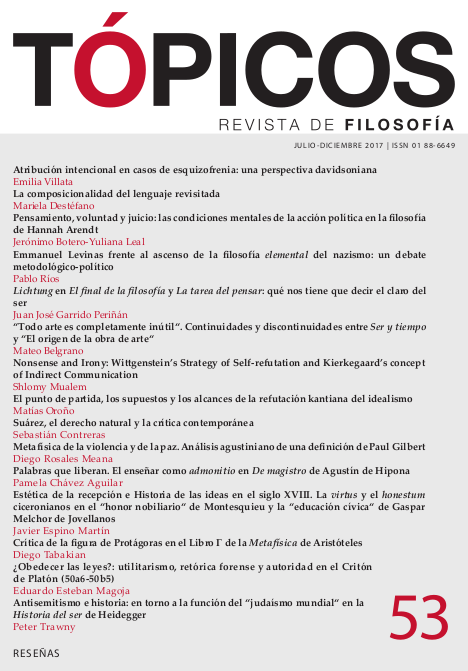Publicado 2017-07-01
Palabras clave
- Kant,
- refutación del idealismo,
- mundo externo,
- escepticismo
Cómo citar
Resumen
El objetivo de este trabajo es brindar una interpretación del argumento kantiano de la “Refutación del idealismo” presente en la segunda edición de la Crítica de la razón pura. Por un lado, sostenemos que el argumento toma como punto de partida una premisa mínima que es compartida con el idealista cartesiano. Sin embargo, en el desarrollo de la argumentación, Kant apela a premisas que no son necesariamente aceptadas por el idealista cartesiano. Por otro lado, afirmamos que el argumento únicamente logra demostrar que la experiencia interna supone la existencia de algo permanente en general, pero es insuficiente para determinar si en un caso determinado nos hallamos ante algo realmente existente en el espacio o meramente imaginario. Concluimos que el argumento sólo cumple su función antiescéptica si es considerado como una pieza perteneciente al cuerpo sistemático del criticismo kantiano.
Referencias
- Descartes, R. (1996). Méditations Métaphysiques. En Adam, Ch. y Tannery, P. (eds.), OEuvres de Descartes. Paris: Vrin-CNRS. (11 volúmenes, volumen IX, tomo I, 4-72).
- Kant, I. (1903/11). Kants gesammelte Schriften. Berlin: Herausgegeben von der Königlich Preussischen Akademie der Wissenschaften.
- Kant, I. (2007). Crítica de la razón pura. Caimi, M. (trad.) Buenos Aires: Colihue.
- Bibliografía secundaria:
- Allison, H. (1992). El idealismo transcendental de Kant: una interpretación y defensa. Granja Castro, D. (trad.) Barcelona: Anthropos/ México: Universidad Autónoma Metropolitana-Iztapalapa.
- Aquila, R. (1979). Personal Identity and Kant’s Refutation of Idealism. Kant-Studien 70, 259-278.
- Bader R. (2012). The Role of Kant’s Refutation of Idealism. Archiv für Geschichte der Philosophie, 94, 1, 53-73.
- Bennett, J. (1966). Kant’s Analytic. Cambridge: Cambridge University Press.
- Caranti, L. (2011). The One Possible Basis for the Proof of the Existence of the External World: Kant’s Anti-Sceptical Argument in the 1781 Fourth Paralogism. Kant Studies Online, 162-192. Recuperado de http://www.kantstudiesonline.net/index.php/articles/eyJyZXN1bHRfcGFnZSI6ImFydGljbGVzXC8ifQ/P36
- ____ (2007). Kant and the Scandal of Philosophy: the Kantian Critique of Cartesian Scepticism. Toronto, Buffalo and London: University of Toronto Press.
- Chignell, A. (2010). Causal Refutations of Idealism. The Philosophical Quarterly, 60, 240, 487-507.
- Emundts, D. (2010). The Refutation of Idealism and the Distinction between Phenomena and Noumena. Guyer, P. (ed) The Cambridge Companion to Kant’s Critique of Pure Reason. New York: Cambridge University Press.
- Friedman, M. (2013). Kant’s Construction of Nature. A Reading of the Metaphysical Foundations of Natural Science. New York: Cambridge University Press.
- Garve, C. y Feder, J. G. (1782). Kritik der reinen Vernunft, Immanuel Kant, 1781, 856 Seiten. Zugaben zu den Göttinger Gelehrten Anzeigen, 3, 40- 48.
- Guyer, P. (1987). Kant and the Claims of Knowledge. Cambridge: Cambridge University Press.
- ____ (1983). Kant’s Intentions in the Refutation of Idealism. The Philosophical Review XCII, 3, 329-383.
- Jáuregui, C. (2008). Sentido interno y subjetividad. Buenos Aires: Prometeo. La Rocca, C. (2003). Soggetto e mondo. Studi su Kant. Venezia: Marsilio Editori.
- ____ (2001). Inner Sense and Self-Knowledge in the Kantian Refutation
- of the Problematic Idealism. Kant und die Berliner Au lärung. Akten des IX Internationalen Kant-Kongresses. (582-590). Berlin: Walter de Gruyter, Bd. II.
- Lynch, G. (2012). The Semantics of Self-Knowledge in the Refutation of Idealism. Kant Studies Online, 172-202. Recuperado de http://www.kantstudiesonline.net/index.php/articles/eyJyZXN1bHRfcGFnZSI6ImFydGljbGVzXC8ifQ/P24
- Moreau, J. (1980). Intuition et Appréhension. Kant-Studien, 71, 3, 282-298. Pringe, H. (2015). Legalidad empírica y realidad efectiva. Ideas y valores 64, 158, 21-39. Recuperado de http://dx.doi.org/10.15446/ideasyvalores.v64n158.40038
- Strawson (2006). The Bounds of Sense. New York: Routledge.






